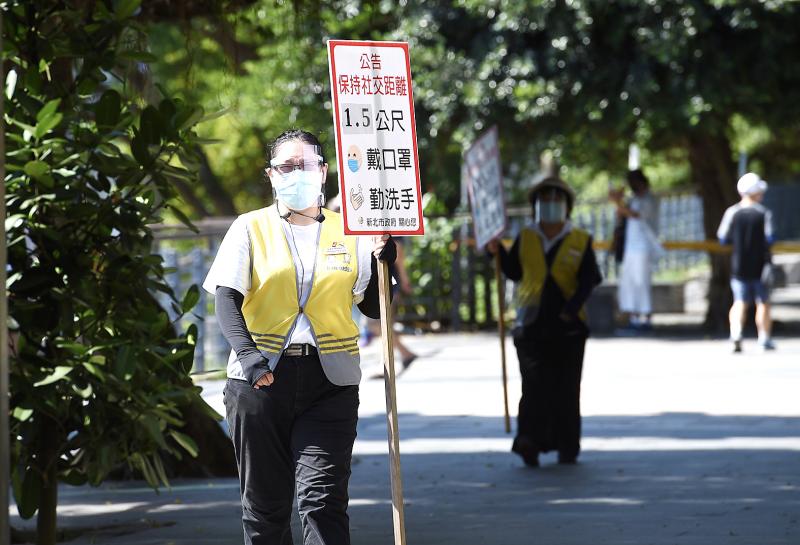Taipei residents listed as contacts of confirmed COVID-19 cases are required to isolate for 14 days at designated quarantine hotels, unless they are able to isolate alone in their own homes, Taipei Mayor Ko Wen-je (柯文哲) announced at a news briefing on Saturday.
The new measure took effect on Saturday.
The regulation is likely to remain in place until infections in the capital city drop to zero, Ko said.

Photo: Peter Lo, Taipei Times
According to the Central Epidemic Command Center, contacts of COVID-19 cases must isolate for 14 days in their own homes.
During that time, they should not share a bedroom or bathroom with those living under the same roof, and they should refrain from having direct physical contact with other people.
Those who are unable to follow the rules must stay in quarantine hotels.
About 10 percent of the Taipei residents who were listed as contacts eventually came down with the disease, Ko said, citing city government data.
The new measure is an attempt to prevent people who are in isolation from spreading COVID-19 to their roommates or family members, Ko said.
About one-third of the domestic COVID-19 cases recorded in the city have been identified as infections within households, city government data showed.
However, under Taipei’s broad definition, household transmission of the virus refers not only to families living under the same roof, but also to people living in shared apartments or who have attended a social gathering in someone’s home.
It was not immediately clear if people listed as contacts would have to pay to stay in a designated quarantine hotel.
The city government is leaning toward exempting them from paying for their accommodation, but that part of the proposal would not be finalized until the city completes negotiations with hotels, Ko said.
The center and Taipei currently provide subsidies of up to NT$14,000 and NT$7,000 respectively for people who stay in quarantine hotels for the 14-day mandatory quarantine period or for self-isolation, and Taipei residents can apply for both.
Beyond isolating contacts of COVID-19 patients, Ko said that the vaccination process is also key to reducing household transmissions.
About 27.8 percent of all Taipei residents have received at least one dose of a COVID-19 vaccine, and the figure is expected to rise to 34 percent by Thursday, he said.
In other news, renowned Taiwanese restaurant chain Din Tai Fung yesterday announced the temporary closure of its Xinsheng branch in Taipei through Tuesday after two of its employees were confirmed to have COVID-19.
The Taipei Department of Health first said that one employee, who was responsible for packing food and had limited interaction with customers, had contracted the virus.
Later yesterday, Din Tai Fung reported that another worker at the branch was infected with COVID-19.
The worker, who checked and packed takeout orders and had not done a shift since Thursday, tested positive on Saturday, the department said.
The Xinsheng branch suspended operations and had all of its employees take a polymerase chain reaction test on Friday, after learning the previous day that a customer who tested positive for COVID-19 had visited the restaurant. The branch had reopened on Saturday.
It is unclear if there is a direct connection between the customer’s case and the employees’ cases.

Alain Robert, known as the "French Spider-Man," praised Alex Honnold as exceptionally well-prepared after the US climber completed a free solo ascent of Taipei 101 yesterday. Robert said Honnold's ascent of the 508m-tall skyscraper in just more than one-and-a-half hours without using safety ropes or equipment was a remarkable achievement. "This is my life," he said in an interview conducted in French, adding that he liked the feeling of being "on the edge of danger." The 63-year-old Frenchman climbed Taipei 101 using ropes in December 2004, taking about four hours to reach the top. On a one-to-10 scale of difficulty, Robert said Taipei 101

Nipah virus infection is to be officially listed as a category 5 notifiable infectious disease in Taiwan in March, while clinical treatment guidelines are being formulated, the Centers for Disease Control (CDC) said yesterday. With Nipah infections being reported in other countries and considering its relatively high fatality rate, the centers on Jan. 16 announced that it would be listed as a notifiable infectious disease to bolster the nation’s systematic early warning system and increase public awareness, the CDC said. Bangladesh reported four fatal cases last year in separate districts, with three linked to raw date palm sap consumption, CDC Epidemic Intelligence

US climber Alex Honnold left Taiwan this morning a day after completing a free-solo ascent of Taipei 101, a feat that drew cheers from onlookers and gained widespread international attention. Honnold yesterday scaled the 101-story skyscraper without a rope or safety harness. The climb — the highest urban free-solo ascent ever attempted — took just more than 90 minutes and was streamed live on Netflix. It was covered by major international news outlets including CNN, the New York Times, the Guardian and the Wall Street Journal. As Honnold prepared to leave Taiwan today, he attracted a crowd when he and his wife, Sanni,

Taiwanese and US defense groups are collaborating to introduce deployable, semi-autonomous manufacturing systems for drones and components in a boost to the nation’s supply chain resilience. Taiwan’s G-Tech Optroelectronics Corp subsidiary GTOC and the US’ Aerkomm Inc on Friday announced an agreement with fellow US-based Firestorm Lab to adopt the latter’s xCell, a technology featuring 3D printers fitted in 6.1m container units. The systems enable aerial platforms and parts to be produced in high volumes from dispersed nodes capable of rapid redeployment, to minimize the risk of enemy strikes and to meet field requirements, they said. Firestorm chief technology officer Ian Muceus said